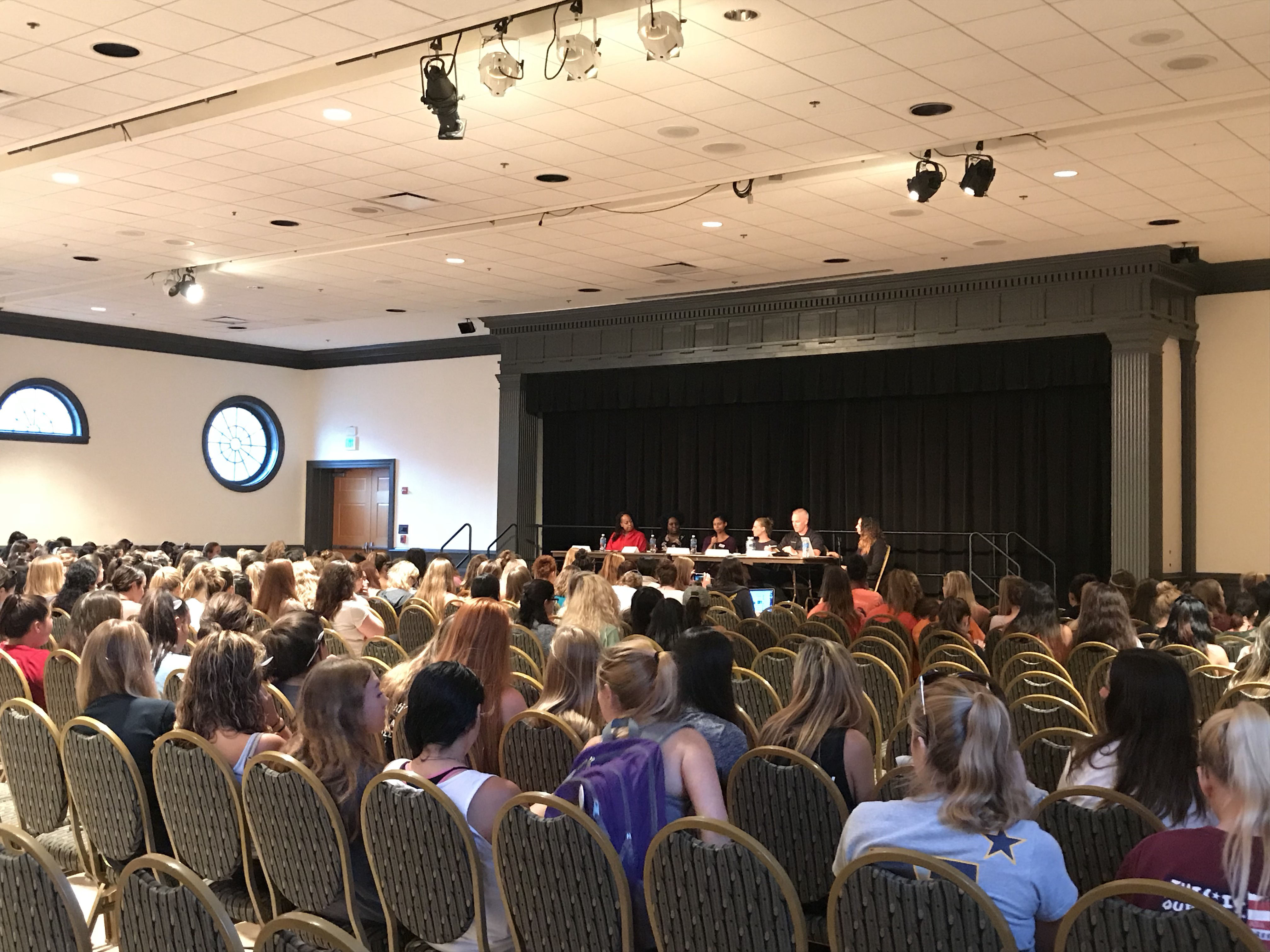A five-member panel discussing strategies for coping with sexual assault drew about 150 University of Maryland students to Stamp Student Union Monday evening.
The panel, part of the It’s on Us campaign to end sexual assault on college campuses, included representatives from University of Maryland Police, CARE to Stop Violence, the Department of Resident Life, the Department of Fraternity and Sorority Life and the Office of Civil Rights and Sexual Misconduct. Each spoke about their roles in the sexual assault reporting process.
The Sexual Assault Response Panel was organized primarily for Greek life members as part of this year’s Panhellenic Association’s Pride Week, but was open for all students.
“Given the statistics, chances are some chapter members are going to encounter situations of assault,” said PHA Vice President of Public Relations Samantha Waldenberg. “A lot of the typical conversation is about preventing sexual assault but we wanted to equip chapter members with the resources and knowledge necessary to respond to assault.”
[Read more: ‘It’s Real’: A seven-part look at how sexual assault is handled at the University of Maryland]
A 2015 Colorado University at Boulder study found that 70 percent of sexual assaults occur during the first semester of school, 65 percent of which happen to first-year students.
The so-called “red zone,” the period between August arrival and Thanksgiving break, is the most likely time for students to experience sexual assault, The Guardian reported in 2016.
“It’s important to start educating people from day one, especially freshmen who are new to a college environment, on what their resources and options are if something were to happen to them,” said PHA Vice President of External Affairs Kate Shannon.
Panelists stressed the importance of survivors making their own decisions about how to respond in the event of assault and provided resources for emotional, physical and legal help.
The panel addressed the implications of U.S. Education Secretary Betsy DeVos rescinding the Obama administration’s guidelines for aggressively investigating campus sexual assault cases. DeVos provided temporary instructions that would allow universities to decide the standard of evidence to use when handling complaints.
Under Obama, colleges and universities used the preponderance of evidence standard, which means that evidence shows it is more likely than not a policy violation occurred. DeVos said schools can now use the clear and convincing evidence standard, which is more difficult to meet.
[Read more: UMD President Loh approves recommendations from sexual assault prevention task force]
Panelist Samantha Williams, a Title IX investigator, told students that on a day-to-day basis her duties have not changed, but said there may be some alterations to the Title IX office reporting process in the future.
“The changes … are kind of terrifying as a woman and a student, but the fact that the university has not changed its sexual assault policies is comforting and good to hear,” said Edith Martinelli a junior landscape architecture major and Alpha Delta Pi member.
The Title IX announcement does not change this university’s “commitment to a learning, living, and working environment on campus that is free from sexual misconduct and violence,” wrote university President Wallace Loh in a Monday press release.
The panel also comes after reports that Title IX Officer Catherine Carroll will now be reporting to the school’s general council rather than to Loh’s assistant president and chief of staff, Michele Eastman. Student Government Association President AJ Pruitt said Carroll categorized the move as a “demotion” during a Sept. 7 conversation.
The panel included discussion of pre-submitted student questions and then moved to an open forum, where several students voiced their own comments and concerns.
The PHA is planning on hosting more events like the panel throughout the school year to focus on sexual assault prevention, Waldenberg said.
“Our chapter members all share the same values of caring for fellow sisters,” Shannon said. “We want to have more personal, informative events to ensure our Greek community is supportive and safe for all its members.”



